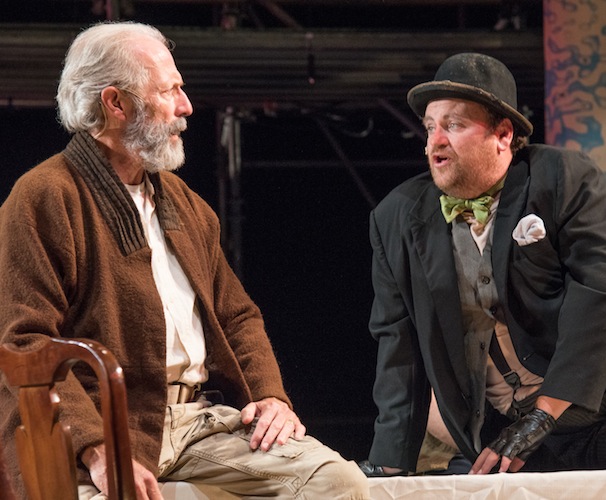Theater Review: The CSC’s “King Lear” — The Deed Dutifully Done
For all of its sound and fury and smoke, the CSC’s version of King Lear is solid rather than surprising or exciting.
King Lear by William Shakespeare. Directed by Steven Maler. Staged by Commonwealth Shakespeare Company on the Boston Common, Boston, MA, through August 9.

Will Lyman as King Lear and Brandon Whitehead as the Fool in the Commonwealth Shakespeare Company production of “King Lear.” Photo: Andrew Brilliant.
By Bill Marx
First, hearty congratulations to Commonwealth Shakespeare Company for 20 years of producing free productions of the Bard on the Boston Common. Like Shakespearean characters in distress, the troupe has had to deal with more than its share of hair-raising up and downs over the years — even what looked at one point like an “exit Boston Common, pursued by bear.” But the project has continued, and if nothing else these annual live stagings expose thousands to the works of the greatest dramatist in the English language. No mean thing in a culture that is increasingly dedicated to the not-so-golden mean.
For its celebration year CSC and director Steven Maler decided to tackle, for the first time, one of the summits of Shakespearean tragedy, King Lear. One senses more than a little intimidation in the company’s attempt to scale this skyscraper of a play. There is an earnestness in the approach, a taint of the moralistic, that works against the script’s unholy reveling in extremes. If tragedy, as Arthur Miller would have it, is about the ‘chickens coming home to roost,” then this time around Shakespeare decided to kill the birds and wipe out the landing pad. There are no nervy excursions into utter darkness in the CSC production, neither in its treatment of violence or of sexuality. Aside from an intriguing opening dream sequence, in which Lear dances with (or is he being grabbed and tugged about?) by his three daughters, this is a generally straightforward production that moves along without attempting to step outside of conventional lines. Its stark, minimalist set is less about grappling with the play’s nihilistic bottom line (“As flies to wanton boys are we to th’ gods,/They kill us for their sport”) than serving as a cleared deck for the spritzing water showers and whirling wind machines of the revved-up storm scene (additional spray supplied by Mother Nature the night I attended). For all its sound and fury and smoke, this version of Lear is solid and dutiful rather than surprising or exciting.
As Lear, Will Lyman is one of the sturdiest monarchs I have seen over the years. The current fashion is to emphasize Lear’s mental debilitation. Simon Russell Beale, in the recent fascinating if misconceived production at England’s National Theater, was bonkers to the point that he strangled the Fool! (On the admirable flip side, Gloucester was waterboarded!) In this production, the well-spoken Lyman is stalwart and stubborn throughout. He never quite ditches his armor of control: so the actor doesn’t get at the sad lyricism found in the character’s descent into madness and fails to whip up the coruscating fervor of Lear’s volcanic furies. But the aged warrior’s reserves of strength, Lear’s mano a mano cursing at the elements, that Lyman brings off with plenty of panache. In many productions it is impossible to believe that Lear at the end of the play has the resources to kill the man who hangs Cordelia. But Lyman’s lean and mean Lear could dispatch a half dozen baddies. The actor also gives the king a quirky attitude at the beginning of the play: he initially looks bored and haughty, setting up the idea that his anger at the botched ceremony is rooted in a selfish disgust — Cordelia isn’t playing the role he assigned her.
Lyman’s voice is a marvelously supple instrument, but he can’t quite surmount the usual obstacle with the over mic’ed CSC productions. In order to make sure everyone in the immediate area hears the verse clearly, the decibel level is locked in somewhere between very loud and even louder. (On the night I attended Deb Martin’s Goneril sounded positively shrieky.)The nuanced vocal modulation that the poetic and psychological power of the lines demand, the sonic spin actors are invited to put on Shakespeare’s language, don’t stand a chance amid the car horn sameness. Still, Lyman managed to play about with his delivery at times: I liked how, during the storm scene, he injected a sense of gentle bewilderment into the moment it occurs to the king that, perhaps, he should have given more thought to helping out the poor.

Deb Martin as Goneril and Jeanine Kane as Regan in the CSC production of “King Lear.” Photo: Andrew Brilliant.
The rest of the CSC cast is dependable rather than galvanizing. Jeremiah Kissel adds some intriguing comic inflections to his generally rote portrait of the loyal Kent. (Am I the only one who thinks the bearded Kissel looks like Ulysses S. Grant in the first scene?) If performed with charismatic bravo, Edmund can come close to dominating the play; but there’s no chance of that with Mickey Solis — his usurping villain is disappointingly matter-of-fact, a middle-level bureaucrat on the make. Brandon Whitehead’s Fool sings well enough, but he doesn’t supply much idiosyncratic comic invention. All of his punch lines are given the same standard vaudevillian oomph.
Martin’s Goneril and Jeanine Kane’s Regan are somewhat one-note, going about their nastiness with grim determination. There’s not much kinky sexual electricity generated between them and Solis’s Edmund; the conniving gals hardly seem to be enjoying the eye-gouging sadism or the cat fight competition. We need to see that these sisters are somewhat exhilarated by living on the edge — planning illicit affairs, leading bloodthirsty armies, and bringing down Big Daddy to boot. Libby McKnight’s Cordelia is a serviceable goodie but a touch too placid. Fred Sullivan Jr.’s laid-back Gloucester never convinces you of the character’s cosmic despair — the potentially touching reunion with Ed Hoopman’s Edgar is emotionally attenuated here, though I enjoyed how Hoopman toyed (he sounded like an enthusiastic tour guide) with the famous ‘cliff of Dover’ speech.
I am glad that the CSC has made 20 and expect there are decades more to come. Now that the company has tackled King Lear I hope that the next time around Maler and company won’t be so respectful and think about entertaining a few risks, bringing a little cheeky invention to the tragedy. The company has been around long enough to earn the right to take some imaginative liberties with its Main Man.
Bill Marx is the Editor-in-Chief of The Arts Fuse. For over three decades, he has written about arts and culture for print, broadcast, and online. He has regularly reviewed theater for National Public Radio Station WBUR and The Boston Globe. He created and edited WBUR Online Arts, a cultural webzine that in 2004 won an Online Journalism Award for Specialty Journalism. In 2007 he created The Arts Fuse, an online magazine dedicated to covering arts and culture in Boston and throughout New England.
Tagged: Boston Common, Commonwealth-Shakespeare-Company, King Lear, Steven Maler

A superb review, Bill, and ballsy as hell, skewing half of Boston’s honor roll of actors along the way. Whatever the Jacobean body count, you remain our finest drama critic.